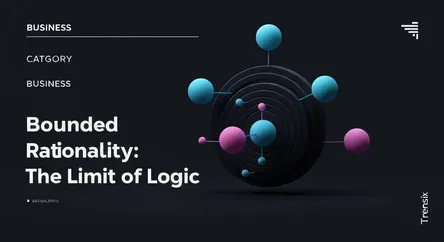Business
Bounded Rationality: The Limit of Logic

Explore Bounded Rationality, the concept that our decision-making is limited by information, time, and our own mental capacity.
What is it?
Bounded Rationality is a concept from behavioral economics, introduced by Nobel laureate Herbert A. Simon. It challenges the idea that humans are perfectly rational decision-makers. Instead, it proposes that our ability to make logical choices is limited, or "bounded," by three key constraints: the finite amount of information available to us, our own cognitive limitations, and the limited time we have to make a decision. Because of these bounds, we often don't seek the absolute best, or optimal, solution. Instead, we tend to "satisfice," choosing an option that is satisfactory or simply "good enough."
Why is it trending?
This concept is a cornerstone of behavioral economics, a field gaining immense traction for its ability to explain real-world market behaviors that classical economic models cannot. As we navigate an era of information overload and complex global systems, bounded rationality provides a realistic framework for understanding human choice. It's also increasingly relevant in artificial intelligence, where developers aim to create more human-like decision-making systems, and in marketing, where it helps explain consumer behavior and purchasing habits.
How does it affect people?
Bounded rationality influences nearly every decision we make. It's why you use mental shortcuts, or heuristics, when choosing a product at the grocery store instead of researching every brand. In personal finance, it can lead to relying on simple rules of thumb for investing rather than complex market analysis. In the workplace, managers make strategic choices based on simplified models of the business environment. Understanding this concept helps people recognize their own cognitive limits, encouraging more thoughtful decision-making and awareness of potential biases in everyday life.